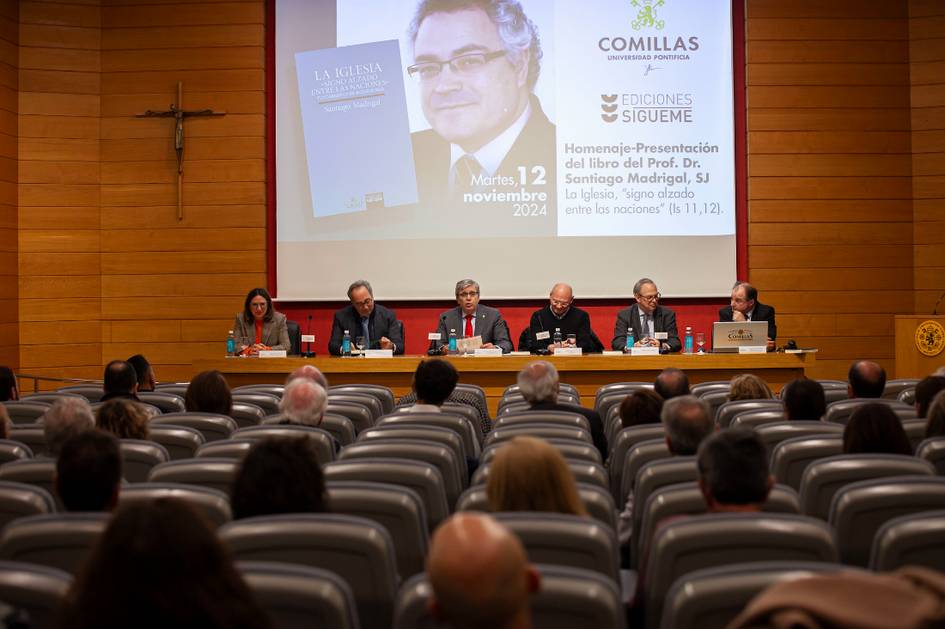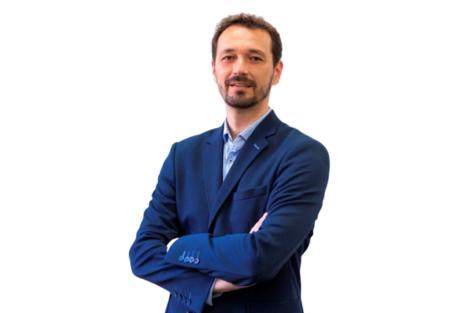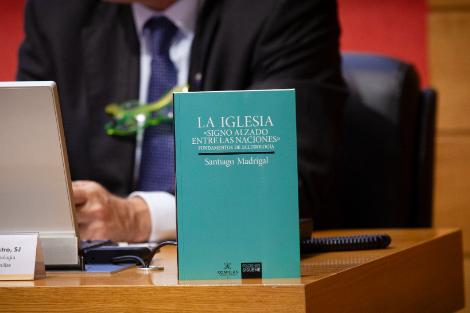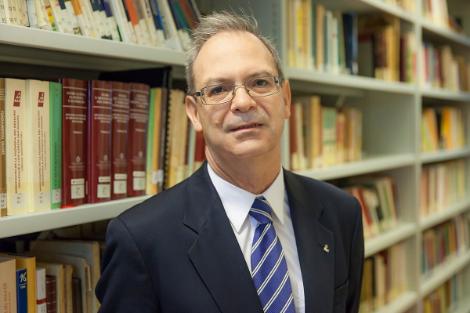Homage to Santiago Madrigal, SJ: "The Church, a sign raised up before the nations (Is 11:12). Fundamentals of Ecclesiology"
The posthumous work of the Professor, published by Publishing House Sígueme , was presented with a heartfelt tribute by professors and friends

The speakers' table during the tribute - presentation
9 December 2024
On 12 November 2024 an emotional act of homage was held in honour of Professor Santiago Madrigal, SJ, on the occasion of the presentation of his posthumous work "La Iglesia, signo levantado ante las naciones. Fundamentos de eclesiología", co-published by the publishing house Sígueme and the Faculty of Theology of the Comillas Pontifical University. Presided over by the rector Antonio Allende, SJ, the ceremony was attended by colleagues from the Faculty of Theology, family members, colleagues from the university and numerous former students who were disciples of Prof. Madrigal.
Recalling his time at the head of the Sal Terrae publishing group, the Rector highlighted the notable contribution of Santiago Madrigal to the publishing house, where he published eight of his books, and pointed out that Santiago "is a person who lends prestige to a publishing house". Allende ended his speech by expressing his joy at the publication of a work that "is one of Santiago's, the Faculty's and the University's great contributions to ecclesiology".
The Dean of the Faculty of Theology, Francisco Ramírez, SJ, highlighted two traits of Prof. Madrigal: "Santiago wanted to be and was a priest of the Second Vatican Council, committed to the mission that the Society and the Church had entrusted to him" he reminded us; he was also "a man of the Church, he loved it, studied it, defended it with passion, but also pointed out its inconsistencies and theologically founded the paths of its reform". He concluded by affirming that with this posthumous work "we are given a magnificent compendium of his teaching and a very large piece of his own life".
Next, with an intervention entitled "The knight-errant of Ignatian ecclesiology", Prof. Gabino Uríbarri, SJ, gave a sketch of his academic, theological, humanist and spiritual profile. He pointed out some of the main features of his ecclesiology: his Ignatian understanding of the Church, his orientation towards mission, his ecumenical imprint and his foundation in the Second Vatican Council. In this sense, he recalled that "if Prof. Madrigal has been admired for anything, it is for his dedication to remember Vatican II, to recreate the theological meaning of its texts, of the event and of its reception".
Prof. José García de Castro, SJ, a specialist in Ignatian spirituality, approached the academic profile of Prof. Santiago Madrigal "from the Jesuit vantage point". He underlined his notable contribution to Ignatian ecclesiology, theology, history and spirituality, highlighting his study of the Rules in order to feel with the Church. "Those of us who were first students, then colleagues and, finally, friends, recognise in his writings the Jesuit imprint of his thought," García de Castro affirmed. He pointed out how James "insisted that one of the great intuitions of the founder of the Society was to link closely, intimately, the mystery of Christ that takes place in the depths of the human heart with the mystery of the Church that unfolds in the depths of the heart of history". He recalled that Prof. Madrigal also dealt with Ignatius' friends - Francisco Javier, Pedro Fabro, Diego Laínez or Alfonso Salmerón - without forgetting some of the most important figures of the fruitful missionary expansion of the Society of Jesus, such as Alessandro Valignano or Matteo Ricci, or more recent figures, such as Pedro Arrupe, whom he deeply admired, or Peter H. Kolvenbach. It is surprising," he concluded, "the gallery of people and Jesuit and ecclesial events on which he dwelt with historical rigour and profound theological intuition".
Eduardo Ayuso, director of the publishing house Sígueme, and Prof. Carmen Márquez, presented the posthumous work of Santiago Madrigal, "La Iglesia, signo levantado entre las naciones (Is 11,12). Fundamentos de eclesiología". Eduardo Ayuso recalled the humus in which the book was born, evoking that first meeting, at the end of the 1990s, when Professors Pié-Ninot and Rovira Belloso introduced him in Rome to a young professor at Comillas called Santiago Madrigal. "We have the possibility of reading and studying in a tight synthesis those fundamental convictions that have accompanied Santiago for a large part of his life on the foundations of the Church," he said, expressing his satisfaction that this work, which had begun to be planned two decades ago, had finally seen the light of day.
Prof. Carmen Márquez, who collaborated in editing the book, presented the content of the work, whose sober subtitle announces the specific subject matter of its pages: those questions that place us on the horizon and the problematic of the credibility of the Church, which account for the origin, nature and the emergence and historical evolution of its structures and institutions.
That the work he was working on and finalising to send to press should finally see the light of day is the best tribute we can pay him from the Faculty of Theology at Comillas Pontifical University, which has been his theological home for almost thirty years. Numerous generations of students have passed through his classes, who thanks to his lessons have learned to know, love and serve the Church, and not a few of us professors who today form his faculty have been his students and we know we are indebted to his ecclesiological thought. We are convinced that his publication renders a great service, not only to the Faculty, where his students continue to be enriched by his ecclesiological knowledge, but also to theology and to the Church, for we have no doubt that his thought will continue to help students of theology and theologians to continue to deepen their knowledge of the Church. Thank you James for leaving us this last work.
All the latest news from the Faculty of Theology can be found on the website, in the monthly newsletter and on the social network X (formerly Twitter).
Image gallery
You may also be interested in

Professor Santiago G. Mourelo publishes this article on the itineraries of education in faith in the magazine Misión Joven, of Salesians

The posthumous work of the Professor, published by Publishing House Sígueme , was presented with a heartfelt tribute by professors and friends

Professor Gabino Uríbarri, SJ participated in the presentation of this book by Carlos María Galli
